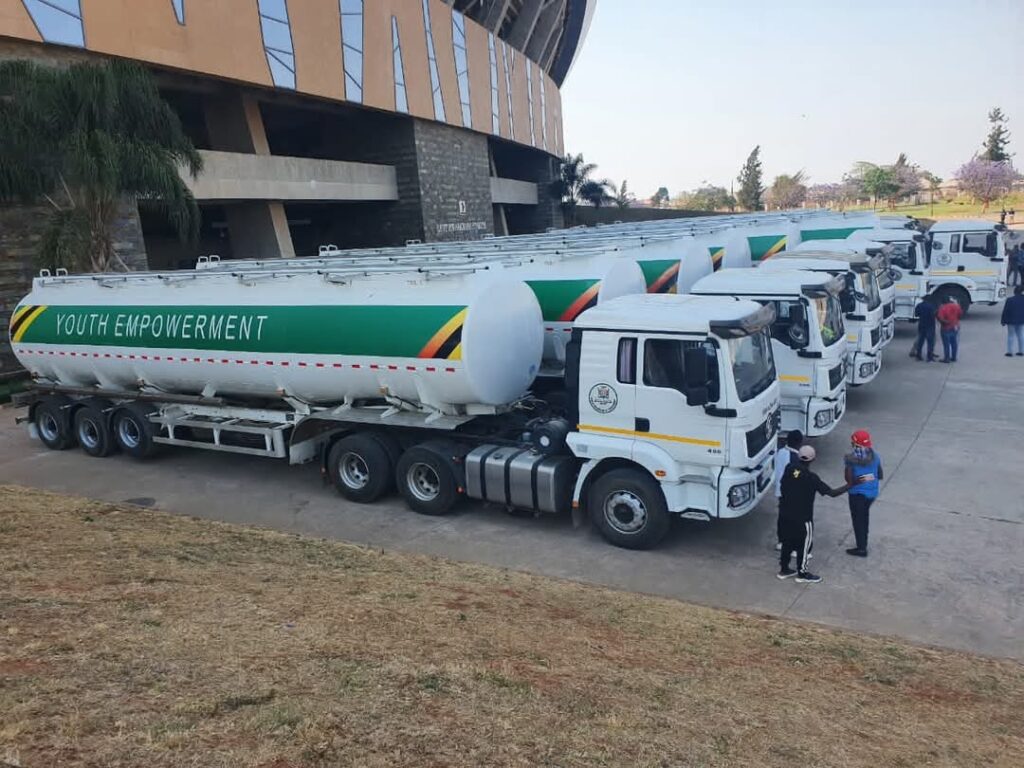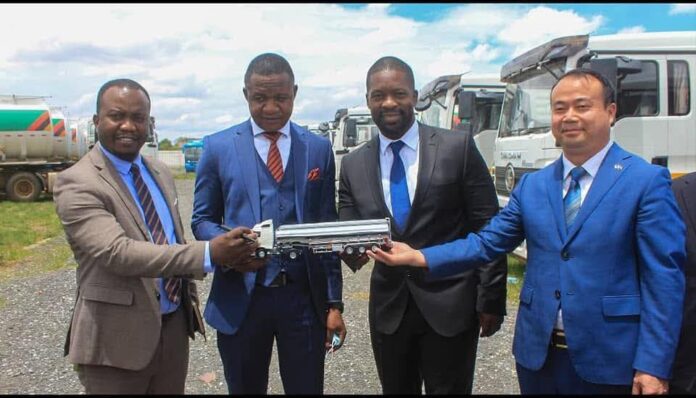By Ennety Munshya
A truck driver at Mount Meru, the company that initially managed some of the tankers, reported seeing them refueling at the Mt. Meru service station in Ndola last year, with the youth empowerment stickers visibly removed. Kapesika Energy and Petroleum Limited was another company involved in managing the tankers during the initial stages.
MakanDay also received information that some of the tankers were parked at the National Heroes Stadium in Lusaka for an extended period.
At the stadium, a source told MakanDay that the tankers were removed in October last year, but their current location remains unknown.
Some sources claim the tankers are fully operational but no longer part of the Youth Empowerment Programme. Where are the trucks?
The Ministry of Youth, Sport, and Arts has not responded to MakanDay’s request for comment. However, on Sunday, February 9, 2025, Youth Minister Elvis Nkandu appeared on ZNBC News, urging oil marketing companies to pay youth cooperatives their share from the tankers.
On September 28, 2022, at a ceremony held at Levy Mwanawasa Stadium in Ndola, Minister Nkandu showcased some of the 70tankers. The event was meant to demonstrate that the tankers had been handed over to 52 youth cooperatives from across the country.

These tankers were supposedly part of a youth empowerment initiative, intended for youth cooperatives to operate and repay through a government loan scheme. However, to this day, their whereabouts and operational status remain unknown—even to the cooperatives themselves.
The scheme was launched under the former ruling Patriotic Front (PF). However, after the United Party for National Development (UPND) took office in August 2021, they assumed control of the programme.
The initiative was originally designed to have established oil marketing companies (OMCs) manage the tankers on behalf of the youth cooperatives for three years. During this period, the loan for the tankers was expected to be repaid to the suppliers—King long Motors Limited, a Chinese-owned automotive company.
After the repayment period, ownership of the tankers was to be fully transferred to the youth cooperatives.
According to information gathered by MakanDay, the projected monthly profits from operating the fuel tankers were approximately $5,000. The revenue distribution was structured as follows:
- 20% allocated to the youth cooperatives,
- 30% directed to the Ministry of Sports, Youth, and Arts for loan repayment,
- 50% retained by the OMCs as their profit.
Payments were supposed to be made monthly. However, MakanDay has learned that the youth cooperatives have only received payments about four times since the programme began.
MakanDay surveyed four cooperatives, all of whom spoke anonymously for fear of reprisals.
One cooperative member expressed that the main challenge they face is the lack of consistent payments as per the agreement with the Ministry. He lamented that payments have not been made consistently to the cooperative.
Despite being given the white book, the cooperative has never seen their fuel tanker and has no information on its operations or movements. He expressed frustration with how the programme has been handled, noting that they expected to be involved at every stage of the business.
“We are not aware of the tankers’ movements. We don’t know how much they are making or where the company managing the tanker is based. While this was a good initiative, we do not like how the programme has been managed,” he said.
Another member from a different cooperative shared a similar experience, noting the issue of inconsistent payments. He mentioned that efforts to get updates from the Ministry had been unsuccessful, with the Ministry only stating that the Oil Marketing Companies (OMCs) were failing to make payments.
He added that the cooperatives were only given the names of the OMCs managing their tankers but had no direct communication with them.
A third member, from another cooperative, said that communication between the Ministry and the cooperatives has been very poor. He noted that of the three to four payments the cooperative has received, they have only received the full amount once, which was in December 2024.
“The payments are not consistent; we have only received payments about four times. In 2024, we only received the full payment once, in December. We are supposed to be receiving $1,000 per month, but we have only received that full amount once,” he explained.
MakanDay contacted the Oil Marketing Companies Association of Zambia (OMCAZ) for comment on the matter.
Association President Kafula Mubanga said that, as of now, none of the OMCs under his association have been given the fuel tankers to manage.
Dr. Mubanga suggested that the government, should have allowed different OMCs to bid for the management of the tankers to ensure transparency in the process. He emphasised the need for accountability and clear answers regarding the whereabouts of the tankers.
According to MakanDay’s findings, some of the companies reportedly awarded contracts to operate the fuel tankers include TBS Petroleum, Tecla Investments, and Nicho Investments.
TBS Petroleum director Thomas Siwale confirmed that his company is one of the companies contracted by the Ministry to manage the tankers. However, he noted that some regulatory procedures were still being finalised before the tankers could become operational. Siwale could not provide the exact number of tankers assigned to his company at the time of the interview.
Contact details for both Tecla Investments and Nicho Investments could not be found.
MakanDay has established that TBS Petroleum was only registered on February 9, 2024. It also appears that some of the cooperatives originally intended to benefit from the programme were replaced by newly registered cooperatives.
For example, Livingstone Fuel Tankers Cooperative—registered on May 25, 2022, according to the Registrar of Cooperatives—is one of the cooperatives that benefitted from the programme. However, these newly added cooperatives also do not know the whereabouts of the tankers and have only received payments three to four times.
MakanDay wrote to the Ministry of Sports requesting an official response on the status of the empowerment programme. However, as of the publication of this article, the Ministry has yet to respond.
On January 3, 2025, Minister Nkandu was quoted by News Diggers stating that no fuel tankers under the Youth Empowerment Scheme remained grounded, as all issues concerning the tankers had been resolved.
In September of last year, the Ministry convened a meeting at Prince Charles Hotel in Lusaka, where Nkandu addressed the challenges that had delayed the programme’s progress. He cited licensing procedures required by the Road Transport and Safety Agency (RTSA), the Zambia Meteorological Agency (ZMA), and the Energy Regulation Board (ERB).
During the same meeting, the Minister apologised to youth cooperatives for the issue of delayed payments and the lack of communication from the Ministry. He assured attendees that payments would be made consistently moving forward.
The meeting was attended by representatives from RTSA, ERB, ZMA, and various OMCs.

Discover more from MAKANDAY
Subscribe to get the latest posts sent to your email.



